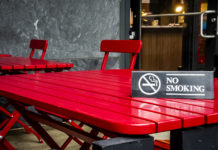Age 21 to Buy—State Level
At the time this article was written, 28 state legislatures had introduced bills to raise the legal age to purchase tobacco products to either age 19 or age 21. So far, the states of Oregon, New Jersey and Maine have enacted a statewide law to increase the legal minimum age to purchase to 21 years old. These states join California and Hawaii—which bumped up the required age last year—increasing the total count across the country to five states that now set the minimum legal age to purchase at 21.
Bills to raise the legal age to 21 that did not pass were considered by lawmakers in Arizona, Arkansas, Connecticut, Florida, Idaho, Illinois, Indiana, Iowa, Maryland, Massachusetts, Michigan, Minnesota, Mississippi, Nebraska, New Mexico, New York, North Carolina, Oklahoma, Rhode Island, Texas, Utah, Vermont and Washington. Also, a bill in North Dakota that would have raised the legal age to 19 failed.
Local Tobacco Ordinances
For the past few years, NATO has been tracking and opposing a growing number of local tobacco ordinances in cities across the country. The proliferation of local ordinances is the real battleground on tobacco restrictions for retailers, with 480 local ordinances proposed in 2015, 675 in 2016 and more than 700 so far in 2017. The three primary types of regulations at the local level are flavor bans of tobacco products, increases to the minimum age to purchase and minimum cigar package/pricing requirements.
One of the most prevalent local regulatory trends is a ban on the sale of flavored tobacco products. In 2016, approximately 80 cities adopted flavor bans across the country. In 2017, 28 cities in four states—Rhode Island, Minnesota, California and Massachusetts—have adopted similar bans.
Additionally, 2017 has ushered in the first ordinances that regulate or ban the sale of menthol cigarettes as well as mint- and wintergreen-flavored tobacco products in local jurisdictions. This year, the following cities have adopted either a limited or complete ban on the sale of tobacco products featuring menthol, mint and wintergreen flavors: San Francisco, Berkley, Contra Costa County, Los Gatos, Santa Clara and Yolo County (all in California), Minneapolis, Minnesota; and Chicago, Illinois. The ban of tobacco products with menthol, mint and wintergreen flavors, which comes on the heels of previously passed flavor bans, represents a real threat to the viability of many tobacco-related retailers.
On the minimum legal age issue, 128 cities in 2016 passed new regulations to increase the legal age to buy tobacco products. While we saw continued growth of this regulation in 2017, the rate of that growth has slowed. So far in 2017, 41 cities have enacted ordinances with an above-18 legal minimum age requirement to purchase tobacco products.
Cigar minimum pricing and packaging mandates also continue to be a common form of local regulation. In 2017, some 16 cities across Minnesota, Massachusetts and California passed or enacted a cigar minimum price or packing regulation.
– Story contributed by Thomas A. Briant, the executive director
of the National Association of Tobacco Outlets (NATO)
This story first appeared in the November/December 2017 issue of Tobacco Business magazine. Members of the tobacco industry are eligible for a complimentary subscription to our magazine. Click here for details.







